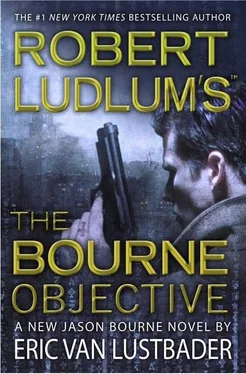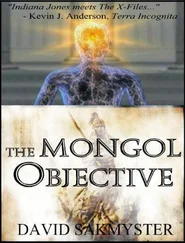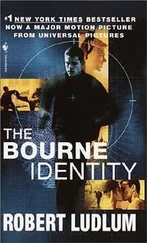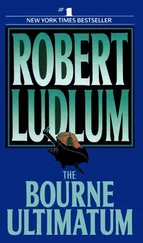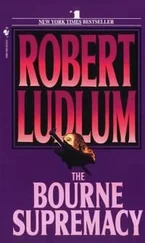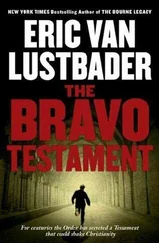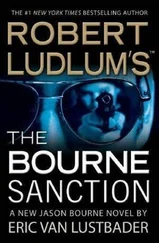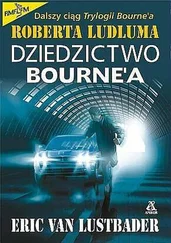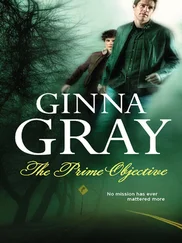Diego gave a low laugh. “Noah often said more or less the same thing.”
Bourne realized that this was as close as Diego Hererra was going to get to asking him if he worked for Perlis’s outfit. He was beginning to like Diego as much as he liked his father, however, that was no reason to tell him the truth. He nodded as if in tacit answer to Diego’s unspoken question.
“I don’t know who he is, either, but it’s important I find out,” Bourne said.
Diego spread his hands. “I am at your service, Señor Stone,” he said in true Catalan style.
Diego may be living in London, Bourne thought, but his heart is still in Seville.
“I need to get this man out of your bank and onto the street before I leave. A fire alarm would do nicely.”
Diego nodded. “Consider it done.” He lifted a finger. “On the condition that you come to my house tomorrow evening.” He gave Bourne an address in Belgravia. “We have friends in common, it would be rude of me not to offer my hospitality.” Then he grinned, showing even, white teeth. “We’ll have a bite to eat, then, if you fancy a flutter, we’ll go out to the Vesper Club on the Fulham Road.”
Diego had a take-charge attitude that was more no-nonsense than egotistical, again very much like his father. This was in line with the profile he’d gleaned from his Web search some weeks ago, but the Vesper Club, a members-only casino strictly for high-rollers, was not. Bourne stuck the anomaly in the back of his mind and prepared to go into action.
The fire alarm went off in Aguardiente Bancorp. Bourne and Diego Hererra watched as the guards swiftly and methodically herded everyone out the front door, Bourne’s tracker among them.
Bourne emerged from the side entrance of the bank, and as the clients milled around the sidewalk, unsure what to do next, he located his tail, keeping the crowd between them. The man was watching the front entrance for Bourne, all the while in a position to check out the bank’s side entrance.
Slipping through the crowd, which had now doubled in size due to curious pedestrians and drivers gawking from their stopped cars, Bourne came up behind the tracker and said: “Walk straight ahead, up the road toward Fleet Street.” He dug his knuckle into the small of the man’s back. “Everyone will think a silenced pistol shot is a lorry backfiring.” He slammed the heel of his hand against the back of the man’s head. “Did I tell you to turn around? Now start walking.”
The man did as Bourne ordered him, snaking into the fringes of the crowd and picking his way, more quickly now, up Middle Temple Lane. He was broad-shouldered with a dirty-blond crew cut, a face empty as an abandoned lot, with rough skin as if he had an allergy or had been in the wind for too many years. Bourne knew he’d try something, and sooner rather than later. A businessman, lost on his cell phone, hurried toward them, and Bourne felt Crew-Cut leaning toward him. Crew-Cut deliberately bumped against the businessman, allowed himself to be jostled sideways by the collision, and was in the process of turning back on Bourne, his right arm bent, his fingers coming together to form a cement block, when Bourne slammed him behind the knee with the sole of his shoe. At almost the same instant Bourne caught his right arm in a vise created by his elbow and forearm, and cracked the bone.
The man buckled over, groaning. When Bourne bent to lift him to his feet, he would have driven his knee into Bourne’s groin, but Bourne sidestepped and the knee struck him painfully, if harmlessly, on the thigh instead.
At that point Bourne became aware of a car racing the wrong way down the street, too fast in fact to slow down, let alone stop before it hit them. He threw the man’s body into the path of the oncoming vehicle and, using the man’s shoulders as a base, vaulted over the hood. With a screech of brakes, the car tried valiantly to decelerate. The moment his shoes hit the top of the car bullets pierced it from the interior, trying to find him, but he was already sliding down the trunk.
Behind him he heard the liquid thunk! as the car slammed into the body, then the stink of burning rubber flayed off the tires. Risking a glance over his shoulder he saw two men emerge, armed with Glocks-the driver and the shooter. As they turned toward him, the huge knot of patrons and staff that had been standing outside Aguardiente Bancorp came streaming up the street, voices raised, cell phone cameras clicking like a forest of cicadas, trapping the two men, pinning them in place. Now curious pedestrians appeared from Fleet Street. Within moments the familiar high-low clamor of police klaxons filled the air, and Bourne, worming into the midst of the throng, slipped quietly away, turned the corner onto Fleet Street, and melted into the city.
I’VE LOST TOUCH with him,” Frederick Willard said.
“You’ve lost touch with him before,” Peter Marks pointed out, he thought helpfully.
“This is different,” Willard snapped. He was wearing a conservatively cut chalk-striped suit, a starched blue shirt with white collar and cuffs, and a navy-blue bow tie with white polka dots. “Unless we’re both careful and clever, this is liable to become permanent.”
Since coming aboard the resurrected Treadstone, Marks had learned quickly that it was a mortal sin to mistake Willard’s age for a loss of vigor. The man might be in his sixties but he could still outrun half the field agents at CI, and as for critical brain function-the ability to think through a problem to its best solution-Marks thought him as good as Alex Conklin, Treadstone’s founder. On top of all that, he possessed the uncanny ability to ferret out his adversary’s weak spots, finding the most novel ways of exploiting them. That Willard was something of a sadist, Marks had no doubt, but that was nothing new in their line of shadow work where sadists, masochists, and every other psychological variant congregated like flies on a rotting corpse. The trick, Marks had found, was discovering the quirk of each person’s personality before he used it to bury you.
They had arranged themselves on a sofa in the foyer of a members-only-and from the looks of things men-only-organization to which Oliver Liss belonged.
“The Monition Club,” Marks said during his hundredth glance around. “What the hell kind of place is this?”
“I don’t know,” Willard said waspishly. “I’ve been trying to find out all day without discovering a scrap of information about it.”
“There must be something. Who owns this building, for instance?”
“A holding company in Grenada.” Willard grunted. “Clearly a shell corporation, and the trail gets more convoluted after that. Whoever these people are they definitely don’t want to be known.”
“No law against that,” Marks said.
“Perhaps not, but it strikes me as both strange and suspect.”
“Maybe I should look into it further.”
The interior was as echoey as a cathedral and, with its stone-block walls, Gothic arches, and gilded crosses, resembled an ecclesiastical institution. Thick carpets and oversize furniture abetted the oppressive hush. Now and again someone strode by, spoke briefly to the uniformed woman behind the high desk in the lobby’s center, then passed into the shadows.
The atmosphere reminded Marks of the prevailing mood of the new CI. From what he’d gleaned from his former colleagues, a new set of unsmiling faces in the support staff and an almost bitter level of gloom infected the hallways. This toxic tone somewhat assuaged the guilt he’d been feeling about bailing on CI, especially because he hadn’t been there for Soraya when she’d returned from Cairo. On the other hand, Willard had assured him that he’d be of more help to her now that he’d moved on. “This way your wisdom and advice will seem more objective and therefore have more weight,” Willard had said. As it turned out, he’d been right. Marks was quite sure that he was the only one who could have persuaded her to join Treadstone.
Читать дальше
